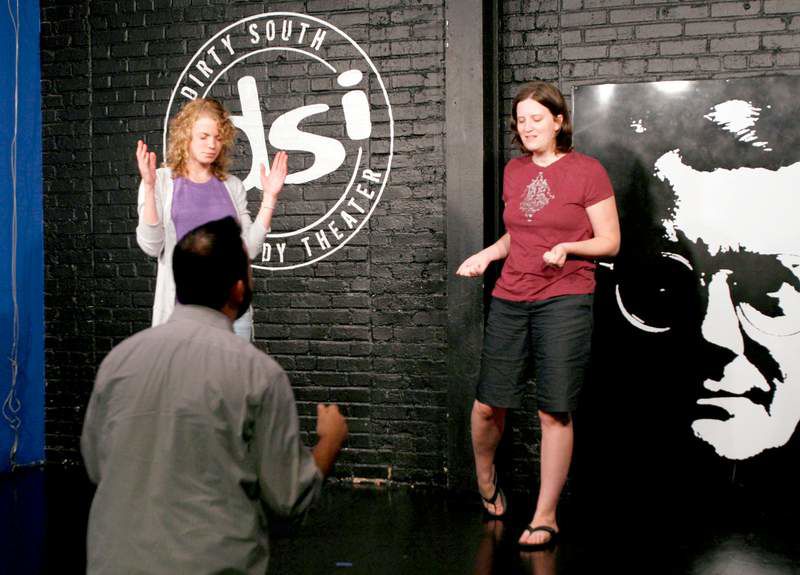Improvising through the recession — literally
Published 5:00 am Wednesday, August 4, 2010

- Comedy instructor Zach Ward, front, works with students Zena Cardman, left, and Nathania Johnson, asking them to visualize a scenario during a class on July 14 in Carrboro, N.C. Workers who take such classes say it trains their brains to think differently.
CARRBORO, N.C. — “Be present in the moment,” Zach Ward tells about a dozen people standing in a loose circle inside the DSI Comedy Theater.
Then he shouts “Zip,” and points at a woman in the circle.
“Zap,” she answers, pointing to another.
“Zop,” is the answering call. And so it goes, words flying.
Next, after a few deep breaths, they take turns throwing pretend daggers at each other.
This is the way Ward, head of DSI, starts the day for students at his intensive two-week improv training workshop.
The warm-up exercises begin the process of rewiring the students’ brains. The idea is to teach people to pay attention — be in the moment — and then to process information as quickly as possible.
“You can’t plan ahead; you have to be able to react,” Ward tells the assemblage.
Flexibility, thinking on their feet, adapting and reacting to their partners are among the lessons that Ward teaches not just to aspiring improvisational actors and standup comedians but to professionals who want an edge in the business world.
That theater, and improv in particular, can make a company or employee more competitive is not a particularly new idea. But what may be surprising is such training has not lost favor during the recession.
Ward has taught corporate and professional classes for 10 years. The recession has not been easy, but he points out: “I’m a for-profit arts organization that has kept the doors open through three of the worst years I’ve seen in my lifetime.”
New approaches
Indeed, there appears to be enough demand to go around. Transactors Improv Co., also in Carrboro, has long offered what Greg Hohn calls applied improv classes. Hohn, Transactors’ executive and artistic director, also teaches the class at the University of North Carolina’s Kenan-Flagler Business School for MBA students.
Kenan-Flagler also offers improv and other nontraditional training (think NASCAR pit crew) in its nondegree executive development program.
Susan Cates, president and associate dean of Executive Development for Kenan-Flagler, says her program has grown substantially over the past two years in revenue and number of clients.
“When you’re asking people to do more with less, you need to arm them appropriately,” she says. “You need to give them the benefit of new approaches. … Pull them out of the day-to-day fighting alligators to stretch their mind.”
The value of improv, say those who teach it as well as those who have taken the classes, is multilayered.
Heather Jones, executive director of Durham Cares, a nonprofit that manages volunteer services, says Ward is training her brain to think differently.
“(I find) myself listening more carefully to details,” she says. “I’m an operations person. … I’m very linear. I work with a guy who is visionary. He has no boundaries. It has been helpful in that scenario. I can sit back and take in his creativity. … I’m able to let it flow.”
Ward says 25 percent of the people who take DSI’s classes want to be on stage. Most are doing it for personal or professional goals.
Nathania Johnson of Raleigh, N.C., has some comedic aspirations, but the freelance writer says her improv lessons are applicable to home (to avoid miscommunication, she now asks her children to repeat what she’s said) and work.
Writing, after all, is about listening, and freelance writers must adapt to what their clients want.
Keeping it positive
Basic improv is the idea of “Yes, and …” — that’s the second exercise for Ward’s workshop on a recent day.
Participants sit in chairs, side by side, on stage. The rest of the class shouts out roles: bull riders, singers, dentists, supervillains, button collectors.
The two on stage role-play, answering each other by repeating what was said.
Supervillain No. 1: “So I finally put the finishing touches on my death ray.”
Supervillain No 2: (Enthusiastically) “Yes, you did finally put the finishing touches on your death ray, and I’m jealous you have a death ray!”
Kim Andrews, who works for a software company and recently took on the improv role of bull rider, says she was in a meeting recently when someone responded to an idea with “Yes, but … “ Her improv training kicked in.
“I thought ‘Hmmm, you just killed the idea,’ ” she says. “Let’s hear the idea out. Maybe the first part wasn’t so good, but the second part is great. So I was able to turn it a little bit.”








